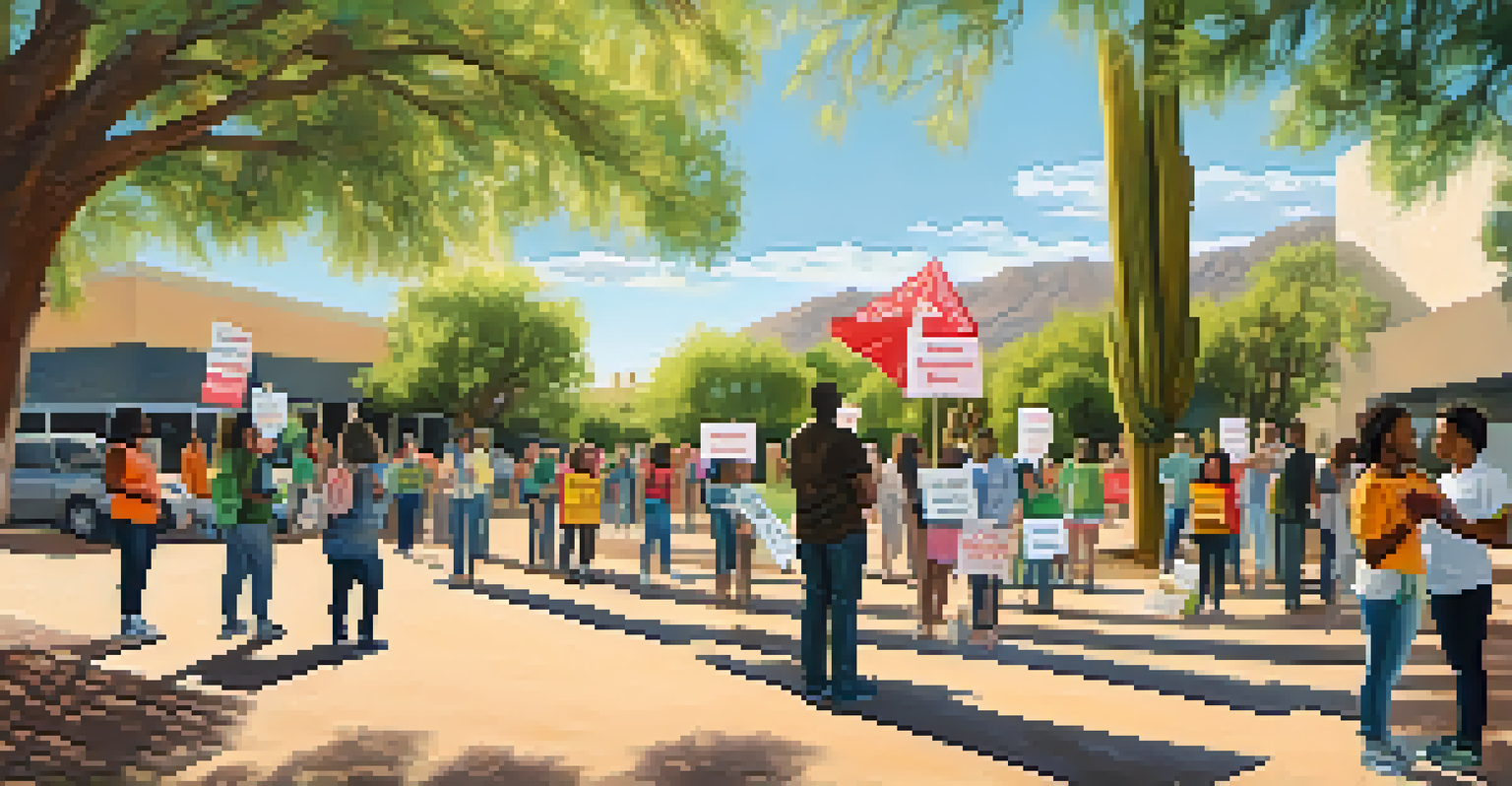Tucson's Public Health Initiatives During the 20th Century

The Origins of Public Health in Tucson
In the early 1900s, Tucson faced numerous public health challenges, including high rates of infectious diseases. The local government began to recognize the need for organized public health initiatives to address these issues. This marked the beginning of a shift towards a more proactive approach to community health, laying the groundwork for future programs.
Public health is a bridge between science and the community.
One of the first steps taken was the establishment of a Board of Health, tasked with monitoring Sanitation and disease control. Public health officials started to implement measures such as vaccination campaigns and improved sanitation practices, aiming to reduce the spread of diseases like tuberculosis and smallpox.
These early efforts were crucial in creating a framework for public health in Tucson, fostering community engagement and awareness. As the century progressed, these initiatives would evolve, becoming more comprehensive and inclusive, ultimately shaping the city's health landscape.
The Impact of World War II on Public Health Initiatives
World War II significantly influenced public health initiatives in Tucson, as the city transformed into a military hub. With an influx of military personnel, local health officials recognized the need to address not only the health of soldiers but also that of the surrounding civilian population. This led to increased funding and resources for public health programs.

Health campaigns during this time emphasized nutrition, sanitation, and disease prevention, reflecting the urgent needs of a wartime society. Initiatives focused on educating the public about the importance of hygiene and proper nutrition, particularly in the context of food shortages and rationing.
Tucson's Public Health Beginnings
In the early 1900s, Tucson established organized public health initiatives to combat infectious diseases, forming a foundation for community health.
The collaboration between military and civilian health officials during this period set a precedent for future public health initiatives. By prioritizing community health, Tucson was able to establish a unified approach that would continue to evolve well into the post-war era.
The Rise of Tuberculosis Control Programs
In the mid-20th century, tuberculosis (TB) emerged as a significant health concern in Tucson, prompting local health authorities to take action. The establishment of TB control programs aimed to educate the public about prevention and treatment options. This was particularly important in combating the stigma surrounding the disease.
The greatest threat to health is the absence of health systems.
These programs included screening initiatives, access to treatment facilities, and community outreach efforts. By implementing widespread testing and promoting awareness, Tucson was able to significantly reduce TB rates over the following decades.
The success of these initiatives not only improved public health but also demonstrated the importance of proactive measures in managing infectious diseases. Tucson's approach to TB control became a model for other cities, highlighting the effectiveness of comprehensive public health strategies.
The Establishment of Maternal and Child Health Programs
As the 1960s approached, Tucson recognized the importance of maternal and child health, leading to the establishment of dedicated health programs. These initiatives aimed to provide essential care to mothers and their children, focusing on prenatal health, nutrition, and immunization. This was a crucial step toward ensuring healthy families and communities.
Public health officials launched educational campaigns to raise awareness about maternal health issues, encouraging regular check-ups and proper nutrition during pregnancy. By offering resources and support, these programs aimed to reduce infant mortality rates and improve overall maternal health.
World War II Boosted Health Initiatives
The influx of military personnel during World War II led Tucson to enhance public health programs, prioritizing community health and collaboration.
The emphasis on maternal and child health would have a lasting impact on Tucson's public health landscape, paving the way for future initiatives. These programs not only addressed immediate health concerns but also fostered a culture of health awareness and access to care for families.
Addressing Mental Health in Tucson's Public Health Framework
By the late 20th century, mental health began to gain recognition as a vital component of overall public health in Tucson. Local health officials started to integrate mental health services within existing public health programs, acknowledging the growing need for community support. This shift reflected a broader understanding of health that encompassed both physical and mental well-being.
Initiatives included public awareness campaigns aimed at reducing stigma around mental illness and promoting available resources. Collaboration between mental health professionals and public health officials helped to ensure that community members had access to comprehensive care.
This integration of mental health services not only improved individual outcomes but also fostered a more supportive community environment. Tucson's proactive approach laid the groundwork for ongoing mental health initiatives that would continue into the 21st century.
The Role of Community Engagement in Public Health
Throughout the 20th century, community engagement played a crucial role in shaping Tucson's public health initiatives. Local residents were encouraged to participate in health programs, providing valuable feedback and support. This collaborative approach empowered communities to take ownership of their health and well-being.
Health fairs, workshops, and volunteer opportunities became common, fostering a sense of community while addressing public health concerns. Residents were not only recipients of health initiatives but also active contributors, helping to identify needs and solutions within their neighborhoods.
Legacy of Community Engagement
Community involvement has been crucial in Tucson's public health initiatives, ensuring programs are tailored to the diverse needs of its residents.
This emphasis on community involvement ensured that public health programs were tailored to the unique needs of Tucson's diverse population. By fostering collaboration between health officials and residents, Tucson created a model for effective public health that prioritized community voices.
Looking Forward: The Legacy of 20th Century Initiatives
The public health initiatives of the 20th century have left a lasting legacy in Tucson, shaping the city's approach to health and wellness. Many of the programs established during this time remain in place today, continuing to evolve to meet modern challenges. The lessons learned from past initiatives serve as a foundation for future public health efforts.
As Tucson faces new public health challenges, including emerging diseases and health disparities, the importance of adaptability and community engagement remains paramount. The proactive measures taken in the past demonstrate the power of collaboration in addressing health issues effectively.

Looking forward, Tucson's commitment to public health will undoubtedly continue to reflect the values of community involvement and comprehensive care. The progress made in the 20th century provides hope and inspiration for future generations in the ongoing pursuit of health equity.